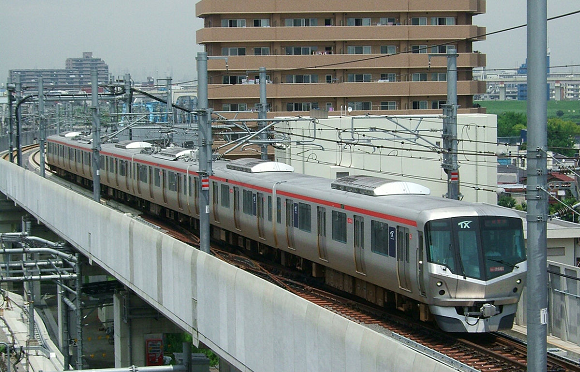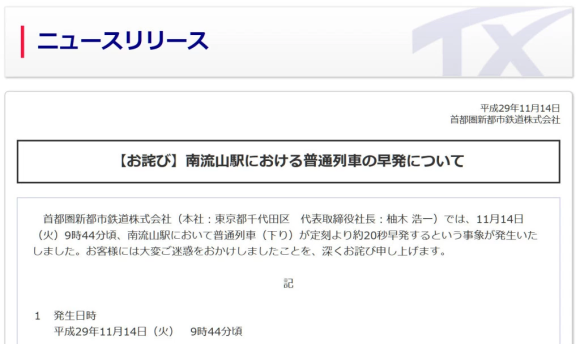
Taking the time to sincerely think about the question “Who cares?” after a minor screw-up is part of what makes life in Japan great.
Japanese trains are awesome for a number of reasons, not the least of which is how amazingly punctual they are. But on Tuesday, a train on the Tokyo-area Metropolitan Intercity Railway Company’s Tsukuba Express line failed to stick to its timetable.
The line connects Akihabara in Tokyo with Tsukuba in Ibaraki Prefecture, and on weekday mornings there’s supposed to be a northbound train that leaves Minami Nagareyama Station at 9:44 a.m. However, on November 14, the train instead left at 9:43:40, 20 seconds earlier than it’s supposed to.
Before the day was done, the Tsukuba Express management issued an official apology, posted to the company’s website.
The statement reads:
On November 14, at approximately 9:44 a.m., a northbound Metropolitan Intercity Railway Company (main office in Tokyo, Chiyoda Ward, President & CEO Koichi Yugi) train left Minami Nagareyama Station roughly 20 seconds earlier than the time indicated on the timetable. We deeply apologize for the severe inconvenience imposed upon our customers.
It’s pretty common knowledge among Japanese people that Japan’s trains are far more precise and punctual than their overseas counterparts, so my coworker, SoraNews24 Japanese-language correspondent Mr. Sato, asked me for my take on this. “I’m Japanese, and even I think it’s excessive to make such a big deal out of a 20-second mistake, but as an American, how do you feel about it?”
At first, I sort of agreed with him. I doubt most people would even notice a 20-second difference, and with trains coming every four minutes on the Tsukuba Express line in the morning, does it really make much of a difference?
But then I thought about it a little more, and realized that because Japanese trains are usually so punctual, some people plan their rail commutes so that they arrive at the platform just as the cars are pulling up (plenty of people even synchronize their watches with the clock at their local station). It stands to reason, then, that at least a few people would miss a train if it left 20 seconds earlier than usual, and even if there’s another coming in four minutes, adding four minutes to that leg of their commute might cause them to miss other transfers on the way to their destinations, with the effect snowballing enough that they end up being late for work or school.
Four minutes times a few transfers could cause someone to be 15 minutes or so late, and while that’s not a huge difference, it’s still an inconvenience, and a potential embarrassment, for the people affected, and all because Metropolitan Intercity Railway Company didn’t deliver on its promise that the train would leave at 9:44, not 9:43:40. Even if that’s not the sort of mistake that absolutely demands an apology, there’s nothing wrong, and definitely something admirable, about taking a moment to say sorry for any problems that the early departure may have caused.
So yeah, if someone at Metropolitan Intercity Railway Company got reamed out by his boss for a 20-second screw-up, I feel for him, since I don’t think it’s worth getting that bent out of shape about. But at the same time, the fact that Japanese companies care so much about customer satisfaction, consistently try to look at things from the end-user’s point of view, and are willing to offer a sincere apology even for understandable inconveniences is, really, one of the most beautiful parts of Japanese society, and one of my favorite things about living here.
Source: Tsukuba Express
Top image: Wikipedia/LERK
Insert image: Tsukuba Express
[ Read in Japanese ]
Follow Casey on Twitter, where his love of Japanese trains doesn’t mean he doesn’t miss his car back in Los Angeles.
[ Read in Japanese ]


 10 misconceptions Japanese people think foreigners have about Japan
10 misconceptions Japanese people think foreigners have about Japan Japanese train company issues official apology for “inexcusable” 25-second early departure
Japanese train company issues official apology for “inexcusable” 25-second early departure 22 February turned out to be a bad day for Tokyo train commuters, as freak delays showed
22 February turned out to be a bad day for Tokyo train commuters, as freak delays showed Train driver’s locked tablet with forgotten password leads to big delay on Fukushima line
Train driver’s locked tablet with forgotten password leads to big delay on Fukushima line Tokyo trains set to become less convenient with new last train schedule
Tokyo trains set to become less convenient with new last train schedule Foreigner’s request for help in Tokyo makes us sad for the state of society
Foreigner’s request for help in Tokyo makes us sad for the state of society Japanese city loses residents’ personal data, which was on paper being transported on a windy day
Japanese city loses residents’ personal data, which was on paper being transported on a windy day Should you add tartar sauce to Japanese curry rice? CoCo Ichi makes diners an unusual offer
Should you add tartar sauce to Japanese curry rice? CoCo Ichi makes diners an unusual offer Seaside scenery, history, and so many desserts on Yokohama’s Akai Kutsu【Japan Loop Buses】
Seaside scenery, history, and so many desserts on Yokohama’s Akai Kutsu【Japan Loop Buses】 Red light district sushi restaurant in Tokyo shows us just how wrong we were about it
Red light district sushi restaurant in Tokyo shows us just how wrong we were about it Suntory x Super Mario collaboration creates a clever way to transform into Mario【Videos】
Suntory x Super Mario collaboration creates a clever way to transform into Mario【Videos】 New Pokémon cakes let you eat your way through Pikachu and all the Eevee evolutions
New Pokémon cakes let you eat your way through Pikachu and all the Eevee evolutions Studio Ghibli unveils Mother’s Day gift set that captures the love in My Neighbour Totoro
Studio Ghibli unveils Mother’s Day gift set that captures the love in My Neighbour Totoro Gacha capsule toy paradise for adults appears at Akihabara Station
Gacha capsule toy paradise for adults appears at Akihabara Station Akihabara pop-up shop sells goods made by Japanese prison inmates
Akihabara pop-up shop sells goods made by Japanese prison inmates McDonald’s new Happy Meals offer up cute and practical Sanrio lifestyle goods
McDonald’s new Happy Meals offer up cute and practical Sanrio lifestyle goods Japanese ramen restaurants under pressure from new yen banknotes
Japanese ramen restaurants under pressure from new yen banknotes French Fries Bread in Tokyo’s Shibuya becomes a hit on social media
French Fries Bread in Tokyo’s Shibuya becomes a hit on social media Studio Ghibli releases new action figures featuring Nausicaä of the Valley of the Wind characters
Studio Ghibli releases new action figures featuring Nausicaä of the Valley of the Wind characters New private rooms on Tokaido Shinkansen change the way we travel from Tokyo to Kyoto
New private rooms on Tokaido Shinkansen change the way we travel from Tokyo to Kyoto Tokyo Tsukiji fish market site to be redeveloped with 50,000-seat stadium, hotel, shopping center
Tokyo Tsukiji fish market site to be redeveloped with 50,000-seat stadium, hotel, shopping center All-you-can-drink Starbucks and amazing views part of Tokyo’s new 170 meter-high sky lounge
All-you-can-drink Starbucks and amazing views part of Tokyo’s new 170 meter-high sky lounge Beautiful Ghibli sealing wax kits let you create accessories and elegant letter decorations【Pics】
Beautiful Ghibli sealing wax kits let you create accessories and elegant letter decorations【Pics】 Studio Ghibli releases Kiki’s Delivery Service chocolate cake pouches in Japan
Studio Ghibli releases Kiki’s Delivery Service chocolate cake pouches in Japan New definition of “Japanese whiskey” goes into effect to prevent fakes from fooling overseas buyers
New definition of “Japanese whiskey” goes into effect to prevent fakes from fooling overseas buyers Our Japanese reporter visits Costco in the U.S., finds super American and very Japanese things
Our Japanese reporter visits Costco in the U.S., finds super American and very Japanese things More foreign tourists than ever before in history visited Japan last month
More foreign tourists than ever before in history visited Japan last month Sales of Japan’s most convenient train ticket/shopping payment cards suspended indefinitely
Sales of Japan’s most convenient train ticket/shopping payment cards suspended indefinitely Sold-out Studio Ghibli desktop humidifiers are back so Totoro can help you through the dry season
Sold-out Studio Ghibli desktop humidifiers are back so Totoro can help you through the dry season Japanese government to make first change to romanization spelling rules since the 1950s
Japanese government to make first change to romanization spelling rules since the 1950s Ghibli founders Toshio Suzuki and Hayao Miyazaki contribute to Japanese whisky Totoro label design
Ghibli founders Toshio Suzuki and Hayao Miyazaki contribute to Japanese whisky Totoro label design Doraemon found buried at sea as scene from 1993 anime becomes real life【Photos】
Doraemon found buried at sea as scene from 1993 anime becomes real life【Photos】 Tokyo’s most famous Starbucks is closed
Tokyo’s most famous Starbucks is closed One Piece characters’ nationalities revealed, but fans have mixed opinions
One Piece characters’ nationalities revealed, but fans have mixed opinions We asked a Uniqlo employee what four things we should buy and their suggestions didn’t disappoint
We asked a Uniqlo employee what four things we should buy and their suggestions didn’t disappoint Princesses, fruits, and blacksmiths: Study reveals the 30 most unusual family names in Japan
Princesses, fruits, and blacksmiths: Study reveals the 30 most unusual family names in Japan What’s the true reason for Japanese train delays classed as “customer support”?
What’s the true reason for Japanese train delays classed as “customer support”? Polish songstress releases debut Japanese album, shares her loves and dislikes about Japan
Polish songstress releases debut Japanese album, shares her loves and dislikes about Japan Japanese railway sets up literal love seats with special seating for couples
Japanese railway sets up literal love seats with special seating for couples Train driver sues Japan Rail…over 56 yen for a one-minute delay
Train driver sues Japan Rail…over 56 yen for a one-minute delay “Passengers who don’t want to be groped, please use the rear train cars” announcement angers Japan
“Passengers who don’t want to be groped, please use the rear train cars” announcement angers Japan Video shows that in Japan, even the train evacuations are orderly 【Video】
Video shows that in Japan, even the train evacuations are orderly 【Video】 Woman kills self jumping onto train tracks, delay causes conductor to jump off tracks at other station
Woman kills self jumping onto train tracks, delay causes conductor to jump off tracks at other station A+ in kindness — Tsukuba university donates over 19 tons of food to students during pandemic【Vid】
A+ in kindness — Tsukuba university donates over 19 tons of food to students during pandemic【Vid】 Hanshin Rail Line gives hilariously cute reason for train delay
Hanshin Rail Line gives hilariously cute reason for train delay These two Tokyo boarding houses are just for anime fans, and they’re looking for new tenants
These two Tokyo boarding houses are just for anime fans, and they’re looking for new tenants Top 10 areas in Japan’s capital region where women who live on their own want to live
Top 10 areas in Japan’s capital region where women who live on their own want to live Convenience store fried chicken gets approved as food for Japanese space program
Convenience store fried chicken gets approved as food for Japanese space program Beautiful Japanese sightseeing train will be unforgettable way to travel country’s north island
Beautiful Japanese sightseeing train will be unforgettable way to travel country’s north island We take a ride on Seibu Railway’s futuristic luxury liner: the Limited Express Laview
We take a ride on Seibu Railway’s futuristic luxury liner: the Limited Express Laview Kyoto train station thanks commuters for saving life of passenger who fell on the train tracks
Kyoto train station thanks commuters for saving life of passenger who fell on the train tracks
Leave a Reply